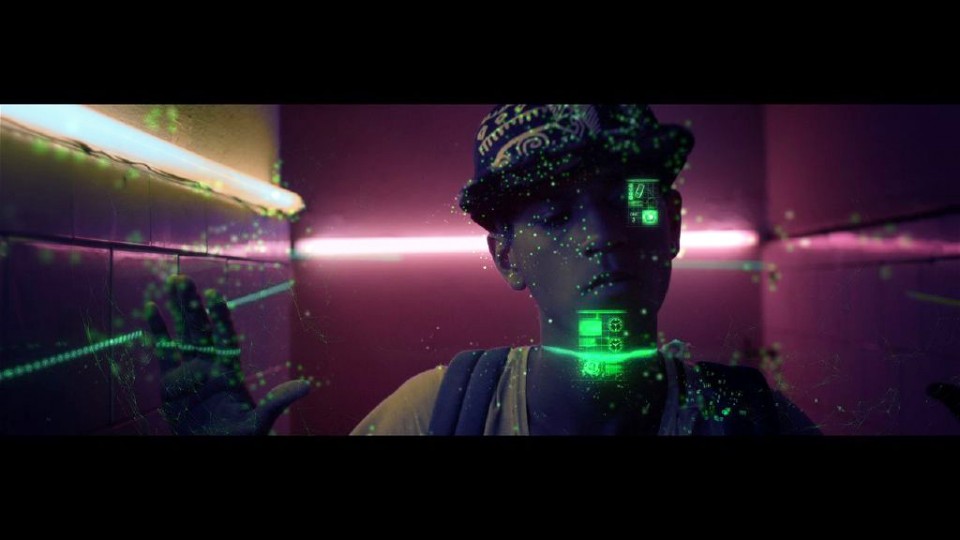
Blacklist/Paranoid director Cisma (Denis Kamioka) whisks us forward in time to document life on the streets of Brazil in 2044 and returns with this 10-minute opus for MC Criolo complete with eerie future tech courtesy of CLAN vfx in São Paulo. Check the following interview with the director to learn how this project reflects a frightening reality in his homeland.
Blacklist: How did this collaboration come about?
Cisma: Daniel Ganjaman (the Sound Producer) is a good friend of mine. We’ve known each other for something like 15 years now. He had reached out to me a while back to make a video for Criolo’s song “Nó na orelha” but at that time they were already touring. Making a music video in the middle of traveling is difficult, so we didn’t go for it then.
But this time we planned the video even before the music for “Duas de Cinco and Cóccix-ência” was released. We shot it on location in Grajaú, where Criolo grew up.
What was it like filming in Grajaú?
Grajaú is a very poor area in south of São Paulo. You don’t go there for fun or tourism, maybe if you know someone who lives there and only if you’re with them. There are extreme problems with their basic infrastructure — electricity is stolen from the power lines, plumbing is almost non-existent, there’s trash everywhere. It’s really heavy.
But at the same time, life is good there. I experienced so many wonderful things that I don’t think you find in wealthier areas. While we were filming, people would start to walk with us, always smiling and giving high fives. Hoards of kids were playing together in the streets. Everyone knows everyone else — I think when you grow up in a place like that, you need to lean on each other to survive, to know each other. The sense of community was overwhelming. It’s really a special place.
Did you grow up in a town like Grajaú?
I didn’t, but getting to know the area was very important to the message of this project. The people of Grajaú are very proud of what they have. Some would have prefered we make a video highlighting the good things their neighborhood has to offer, but it was essential to this project that we underline the corruption and inequality that exists there.
Tell us how that inequality and corruption ties into the storyline for this video.
The film is a cautionary tale. The year is 2044 yet the same cycle of problems fuel the economy. The technological advancements – advancements that are supposed to make life better in the future – are keeping society locked into the same pattern. We wanted to show how the same inequalities will still exist if there’s no change. Nobody wants it, but it’s already going on. It’s their present and it’s their future. They have 30 years to make a change.
You originally wrote only one script. How did it evolve into a story for both sides of the album (“Duas de Cinco” and “Cóccix-ência”)?
Many of Criolo’s friends came out to help during production. They live this story everyday and understood the message we wanted to get across, so we created new scenes for them – the guys eating noodles and watching soccer, the people on the ground checking their smartphone, the kid being robbed in the hallway. These little moments weren’t in the original script but there was such authenticity in their actions that they ultimately strengthened the story and showed how aggressive life can be in Grajaú.
When I began assembling the footage I realized the video was about three times longer than what was needed. It dawned on me that although Criolo launched both songs together, we were only planning to make a video for ”Duas de Cinco.” It’s a little hard to fully grasp if you don’t speak Portuguese, but his lyrics in “Cóccix-ência” sync so completely with the content for the second part of the film that we wove the songs together and created one, unified video. It was sort of magical. It felt like they were created to exist together the whole time.
Does Criolo appear in the video at all?
He does. He’s the teacher. His character also appears when the kids are burning their 3D printed guns in the fire. He’s looking down at them from the rafters. You know, Criolo was a teacher in real life, for 12 years. He taught art.
Did anything surprise you while filming?
On the second day of filming, one of the main characters told me his boss was unhappy that he was taking off work to be a part of the music video. If he missed another day of work he was going to be fired. I was worried and asked what I could do. I offered to call his boss, maybe thank his company in the credits. But the actor turned to me and said, ”No! This is my dream! This is what I want to do!”
And he got fired! He was very close to being a full-time employee with benefits, but he didn’t care. He told me not to worry because he was where he wanted to be.
Direction and screenplay: Denis Cisma
Main actors: Daniel Dantas, Morgana Naughty and Léo Loá
Production: Paranoid
Photography director: Will Etchebehere
Post-production and visual effects: CLAN vfx
Assembly: Fernando Stutz and Marilia Ramos
Soundtrack: Duas de Cinco – composers: Criolo, Daniel Ganjaman, Marcelo Cabral and Rodrigo Campos | Cóccix-ência – composers: Criolo, Daniel Ganjaman and Marcelo Cabral
Recording and editing studio: Oloko Records
Production coordination: Andrezza de Faria, Luciana Oppido, Gabi Hahn and Marina Blum
Production director: Silvio Bettoni
Post-production coordination: Andreia Lopes and Roberta Bruzadin
Coloring: Fernando Lui
Graphics: João Schimidt
Composition: Gustavo Samelo
3D supervision: Luciano Neves
Executive production of post-production: André Pulcino
Executive production of post-production assistant: Diego Souza
Assistant director: Camila Andreoni
Art director: Olívia Sanches
Art assistant: Clarice Cunha
Stagehand: Igor Apoena
Art clerks: Felipe Santana and Marcão
Wardrobe: Marina Vieira
Wardrobe assistants: Vinicius Couto and Tainara Dutra
Objects production: Bella Yumi
On-location production in Grajaú: Bruno Camargo
Machinery: Israel Basso
Gaffer: Marcelo Pinheiro
Cameraman: Thomas Dupre
Camera assistants: Joana Luz and Cris Zurrilho
Direct sound: Rene Brasil
Make-up designer: Denise Borro
Make-up artist: Lilian Berzin De Oliveira
Casting producer: Barbara Catani
